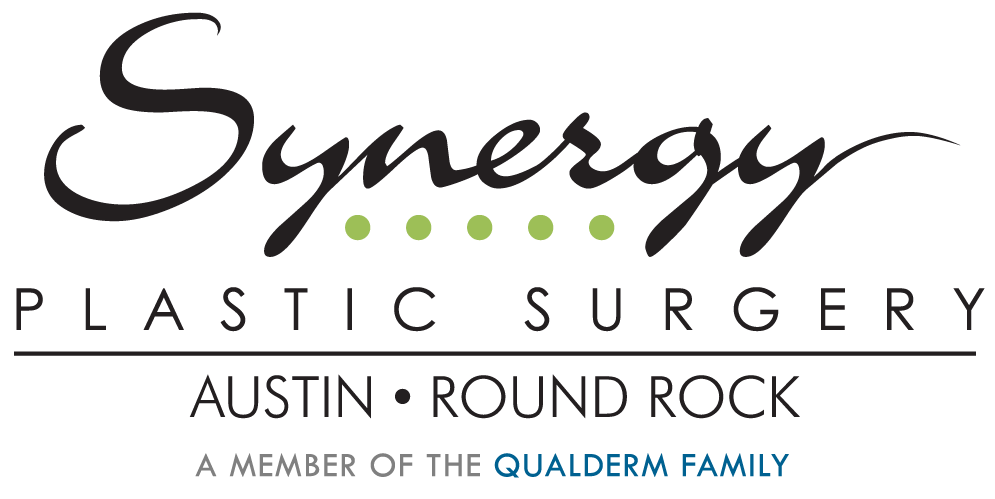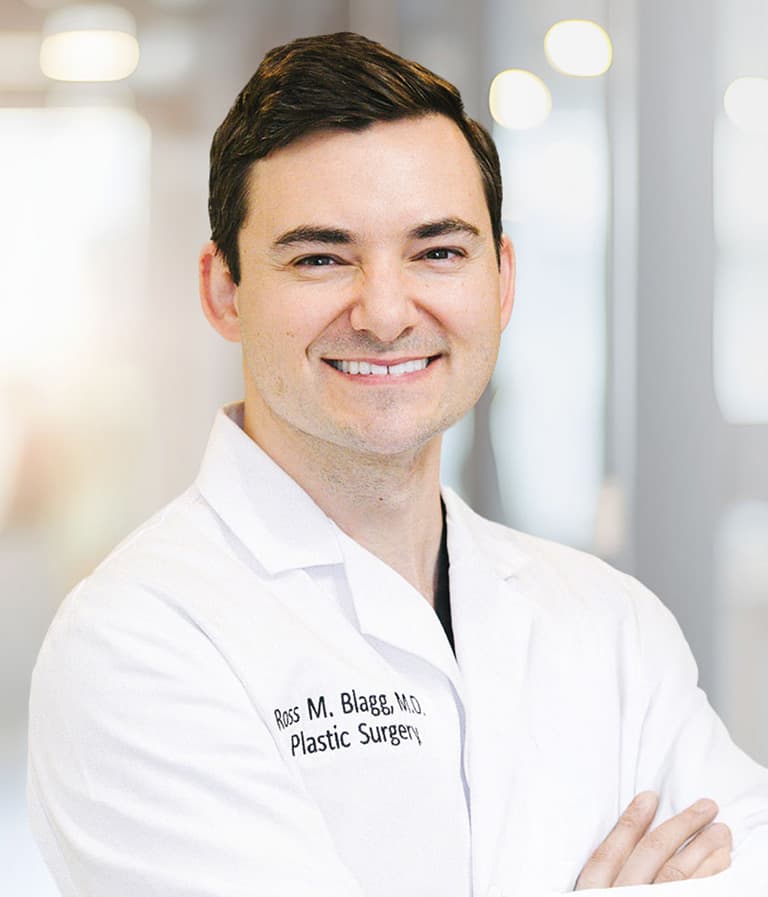Synergy Plastic Surgery
11200 Menchaca Rd., Suite 201, Building 2
Austin, TX 78748
Phone: (512) 244-1439
Monday–Thursday: 9 a.m.–5 p.m.
Friday: 9 a.m.–2 p.m.
Synergy Plastic Surgery
3355 Bee Caves Rd., Suite 401, Building 4
West Lake Hills, TX 78746
Phone: (512) 284-8775
Monday–Thursday: 9 a.m.–5 p.m.
Friday: 9 a.m.–2 p.m.
Synergy Plastic Surgery
7700 Cat Hollow Dr., Ste. 103
Round Rock, TX 78681
Phone: (512) 244-1444
Monday–Thursday: 9 a.m.–5 p.m.
Friday: 9 a.m.–2 p.m.
Synergy Plastic Surgery
3503 Wild Cherry Dr., Building 16
Lakeway, TX 78738
Phone: (512) 518-4134
Monday–Thursday: 9 a.m.–5 p.m.
Friday: 9 a.m.–2 p.m.
Meet Dr. Ross Blagg
Board-Certified Plastic Surgeon in Austin, TX
Dr. Ross Blagg is a board-certified plastic surgeon known for his compassion, creativity, and commitment to delivering thoughtful, patient-centered care. He is a man of many interests, but each reflects a genuine desire to make the world a better place. Dr. Blagg has specialized training in both cosmetic and reconstructive surgery and would be honored to be part of your surgical journey.
Credentials At A Glance
Education
- Fellowship – Craniofacial/Pediatric Plastic Surgery; University of Utah
- Residency – Combined Plastic and Reconstructive Surgery; University of Utah
- Doctor of Medicine (MD) – University of Arkansas for Medical Sciences
- Research Fellowship – Facial Reconstructive Surgery; University of Louisville
- Undergraduate – University of Arkansas
Society Memberships
- American Society of Plastic Surgeons
- American Society of Craniofacial Surgery (ASCFS)
- American Cleft Palate-Craniofacial Association (ACPA)
- Travis County Medical Society
- Texas Medical Association
Credentials
- Board Certification – American Board of Plastic Surgery
- Licensure – Physician and Surgeon, State of Texas; Federal DEA License

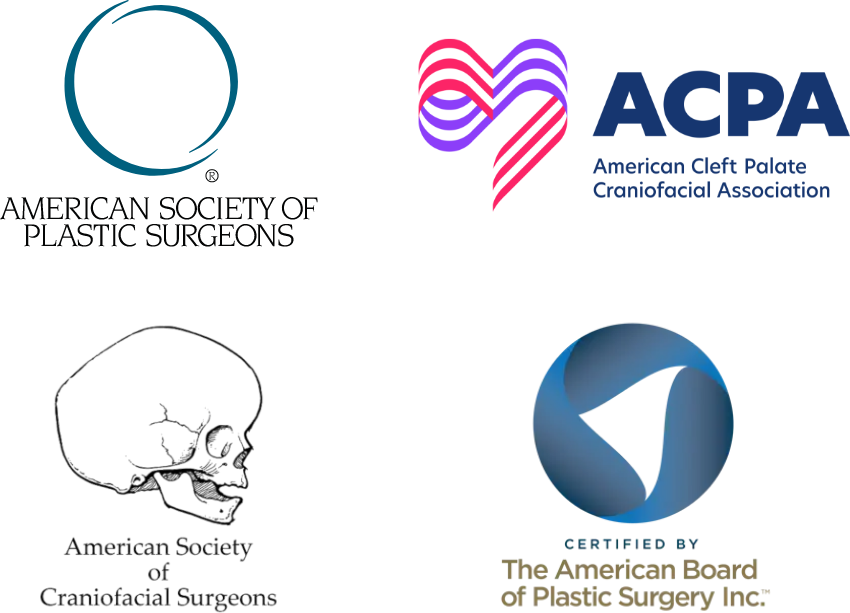
Called To Serve From an Early Age
After undergoing open heart surgery as an infant, Dr. Blagg spent most of his formative years attending medical appointments. He knew from a very young age that he wanted to be a doctor and make a similar difference in people’s lives. As a teenager, Dr. Blagg was allowed to ‘scrub in’ with a family friend and get his first glimpse into what being a surgeon looked like.
Familiar with Dr. Blagg’s bright mind and creative talents, that same family friend suggested Dr. Blagg consider plastic surgery: the perfect blend of science and artistry and a field where he could help more patients—not just the ill and injured but those seeking to look and feel like their most authentic selves.
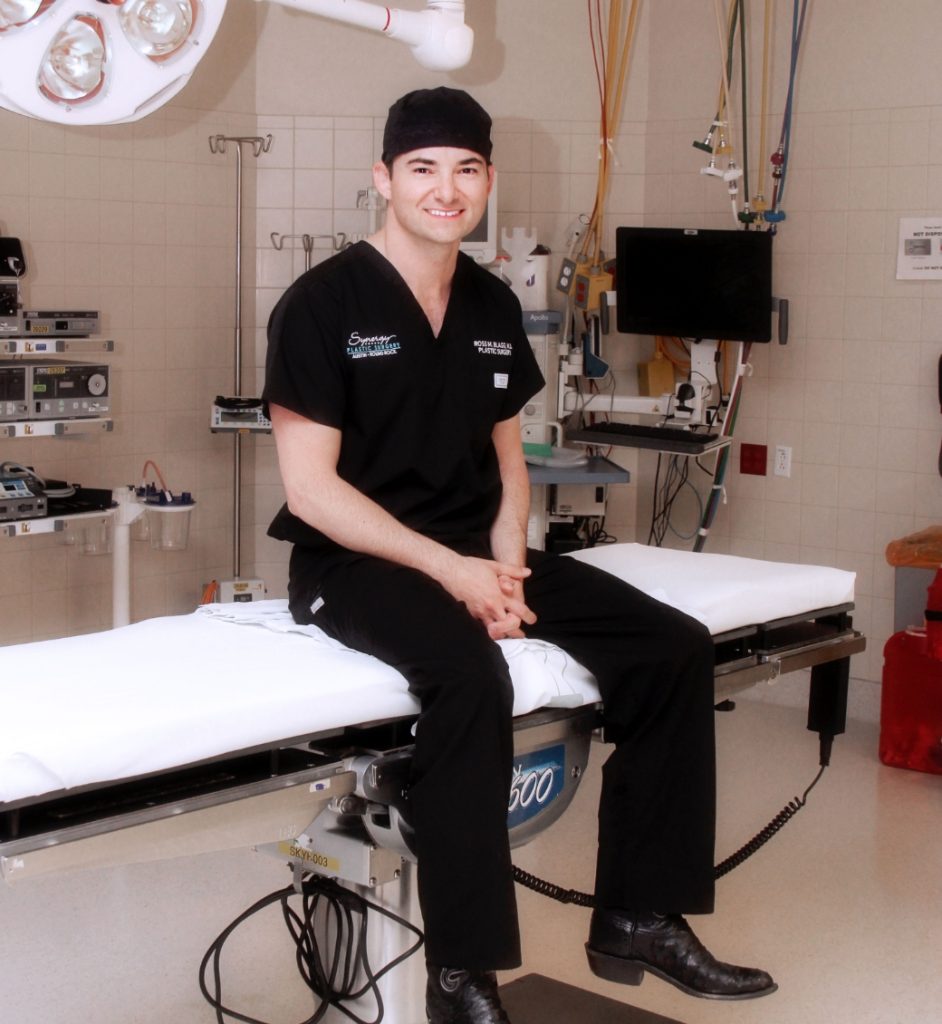
Excellence in Education
As a graduating high school senior, Dr. Blagg earned the prestigious Governor’s Distinguished Scholarship. He attended the University of Arkansas and was honored by both the university and his fraternity for his excellence in and outside the classroom.
The latter, Sigma Phi Epsilon, awarded Dr. Blagg the Balanced Man Scholarship for exemplifying their values of virtue, diligence, and brotherly love—three qualities that can still be seen in Dr. Blagg’s practice today. He was further honored with the University of Arkansas Chancellor’s Scholarship for his stellar academic performance.
After earning his undergraduate degree in biology, Dr. Blagg went on to complete medical school at the University of Arkansas for Medical Sciences. He similarly demonstrated his intelligence, skill, and compassion during this time, ranking at the top of his class and earning multiple accolades and scholarships, including the Dr. George S. Wise Memorial Scholarship for Humanism in Medicine and the Edward Forrest Ellis Award.
This latter accolade is given to the senior medical student who is showing the most promise in the field of surgery. Dr. Blagg graduated from UAMS with honors and was inducted into the exclusive Alpha Omega Alpha national medical honor society.
An Unmatched Beadth and Depth of Training
Dr. Blagg relocated to the West Coast for his residency training. He first completed a combined residency in general surgery and plastic and reconstructive surgery at the University of Utah before pursuing a one-year facial plastic surgery fellowship at the same institution.
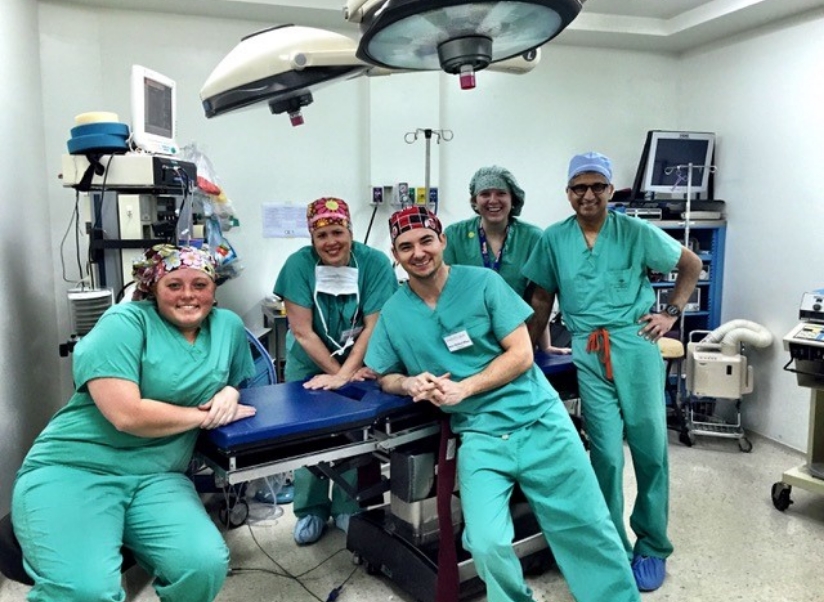
During his fellowship, Dr. Blagg worked with both plastic surgery residents and medical students, serving patients through University of Utah Hospital and the Veteran’s Administration Hospital in Salt Lake City. He specialized in craniofacial and pediatric plastic surgery, a natural extension of the groundbreaking research he conducted during medical school.
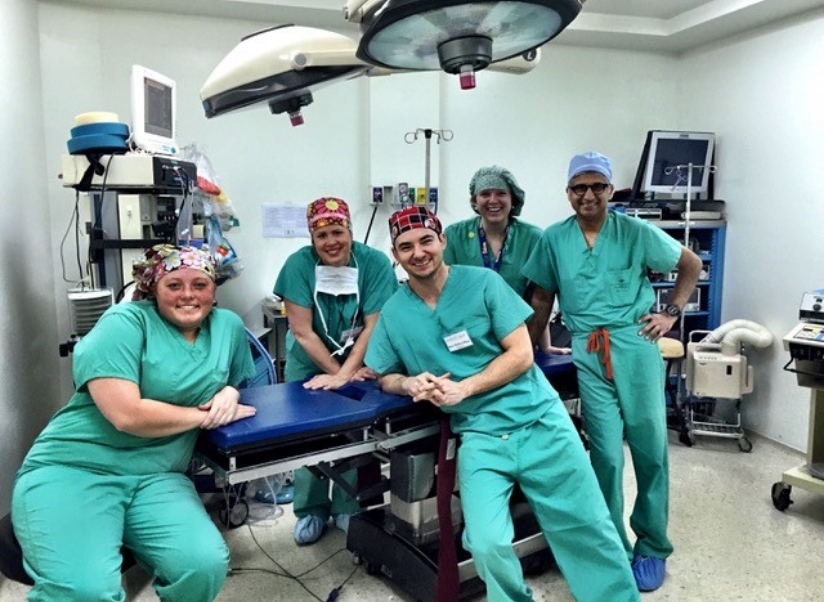


Pioneering Research in Facial Plastic and Reconstructive Surgery
As a rising sophomore at UAMS, Dr. Blagg undertook a summer-long research fellowship at the University of Louisville School of Medicine in Kentucky. At that time, a face transplant had never been performed in the United States, and considerable data and research were needed to get the board approval to do so.
Dr. Blagg and his colleagues focused on the anatomical constraints of performing a full facial transplant to understand how, or even if, the nerves could be regenerated and peri-orbital function (such as blinking) could be returned. They successfully mapped the area around the eyes and identified the mechanisms by which the transplant recipient could attain normal movement and function after the procedure.
A few years later, the first face transplant in the U.S. took place, followed by many successful cases. Dr. Blagg credits this project and his colleagues with expanding his view of plastic surgery. It helped solidify his desire to specialize in cosmetic and reconstructive procedures and inspired his diverse expertise in the field.
Special Clinical Interests
Dr. Blagg’s passion and undeniable talent for plastic surgery extend to procedures of the breast, face, and body. As he explains it, when he knows that a procedure has really changed a person’s life for the better, that procedure is typically his favorite for the week!
Some of the most consistently rewarding procedures Dr. Blagg performs include:
Dr. Blagg enjoys working with diverse populations, ranging from cosmetic and reconstructive patients, those who have undergone massive weight loss, transgender individuals, pediatric patients, and more.
Getting to play such an active role in helping people achieve a better quality of life is one of the best and most meaningful parts of Dr. Blagg’s job, whether he is working with patients from Synergy or providing humanitarian aid in developing countries.
Moms are such superheroes, and they sacrifice so much for their children and families. Many people don’t realize how much they sacrifice of their bodies, as well. For some mothers, this causes them distress, and I enjoy being able to help them feel better.”
– Dr. Ross Blagg
A Passion for Improving Lives
Dr. Blagg has been on several international surgical missions, traveling to Haiti, Guatemala, and El Salvador to provide critically needed reconstructive care. Moved by his experiences abroad, Dr. Blagg founded Humanitarian Plastic Surgery in 2013. This organization coordinates reconstructive surgeries for patients in countries where care is limited.
In the decade since he founded Humanitarian Plastic Surgery, one particular encounter stands out:
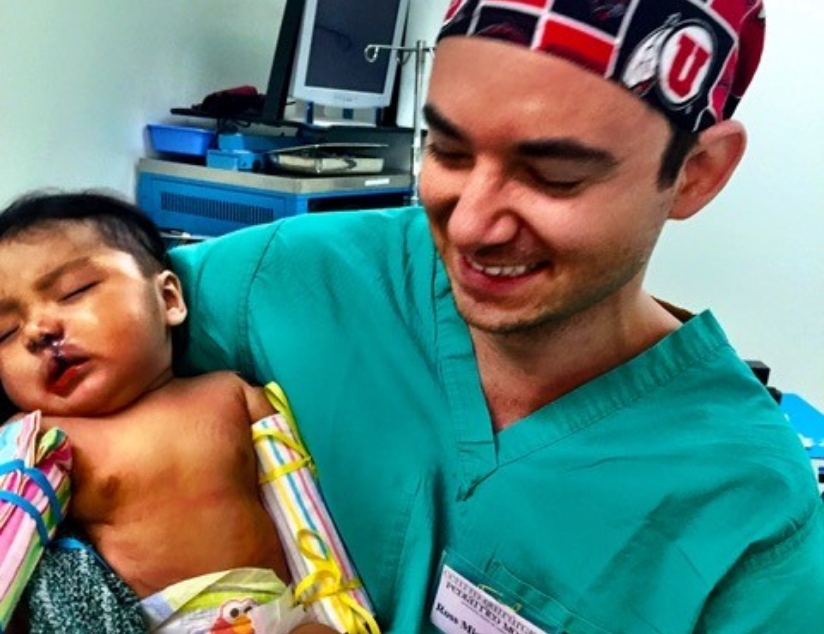
When I was last in Guatemala, I met a 3-year-old boy from El Salvador. His mother had been to 2 other countries trying to have her child’s cleft lip repaired before finding our organization. I couldn’t believe it. It’s unheard of in the U.S. for a 3-year-old to still have a cleft lip. After seeing that mother’s response to her child having his cleft repaired, I had fuel to continue doing what I do for years to come. People often think that doing “humanitarian” work is purely altruistic, but I have to say that I get so much more out of anything I ever give.”
Dr. Blagg goes on to explain:
I went into medicine because I wanted to help people. I’m fortunate to get to do that in my everyday life, but there is something uniquely rewarding in performing reconstruction for people with so much less—to feel that you have enhanced a life that is afflicted daily with a lack of basic resources, such as food and shelter, that we take for granted daily, is truly a privilege.”
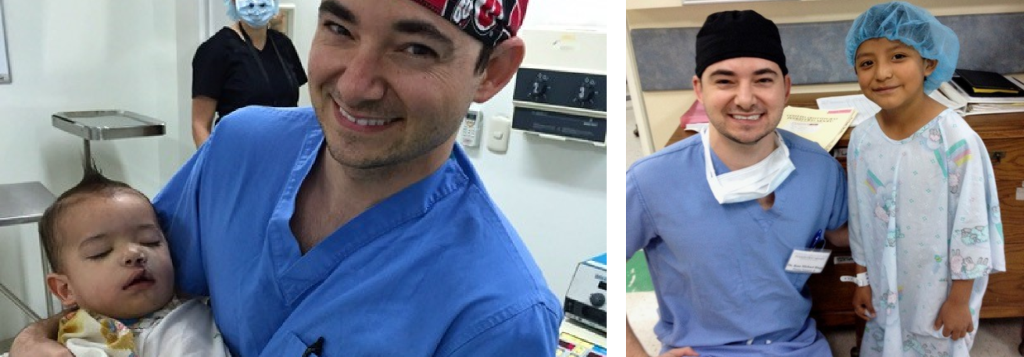
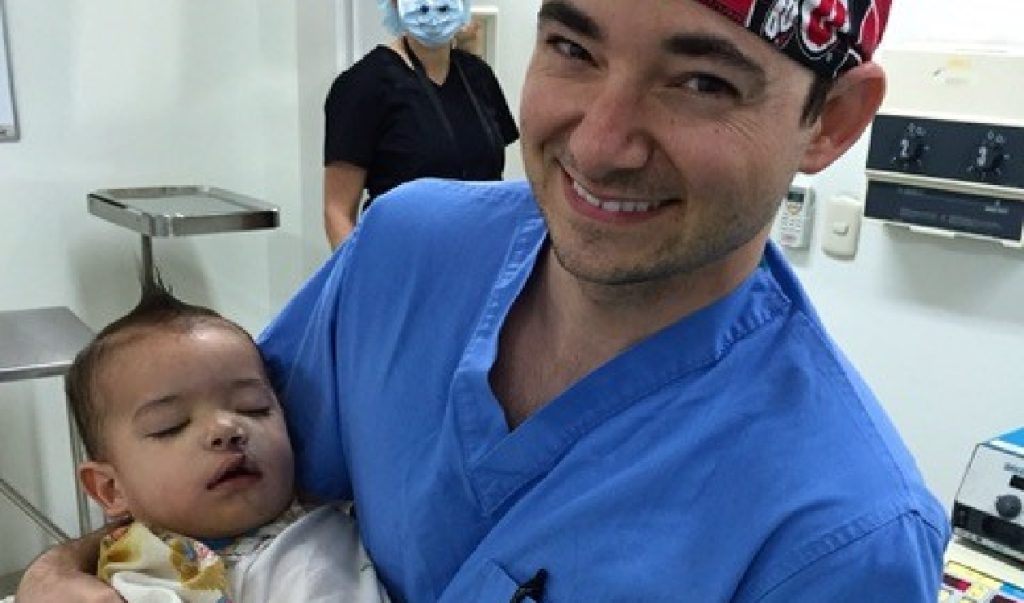
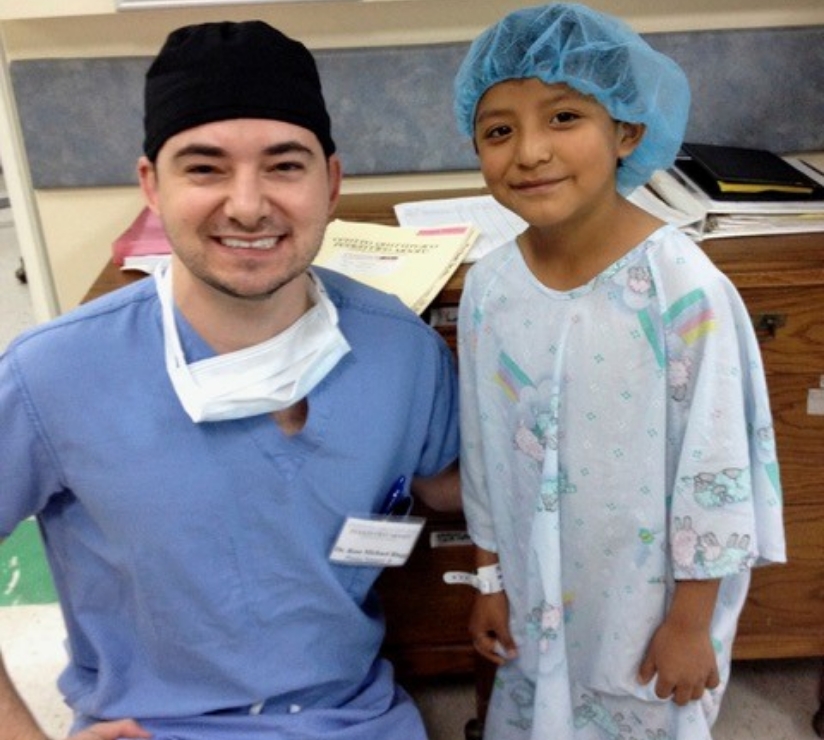
Going the Extra Mile
During the pandemic, Dr. Blagg developed a YouTube Series called “Plastic Surgery Road Trip” to highlight what plastic surgery can provide to people throughout the country. He sought to challenge the sensationalized, overly dramatized view of plastic surgery and show people that plastic surgery can be for everyone—not just celebrities.
Through these videos, Dr. Blagg demonstrated how ‘normal’ people could overcome barriers in their current lives and enjoy more fulfilling lives on their own terms. This series was also a way to give back to deserving individuals who may not have otherwise had access to such procedures. The patients he featured had already put in the work toward their dream bodies. As lifestyle changes can only take people so far, Dr. Blagg’s role was to put the finishing touches on their transformations and make those dreams a reality.
An Authentic Experience for Each Patient
Whether through his travel series or in the office, Dr. Blagg takes a genuine interest in each patient’s story and the ‘why’ behind their decision to pursue surgery. He always aims to put his patients at ease and guide them through their surgical journeys in a way that makes them feel heard and supported.
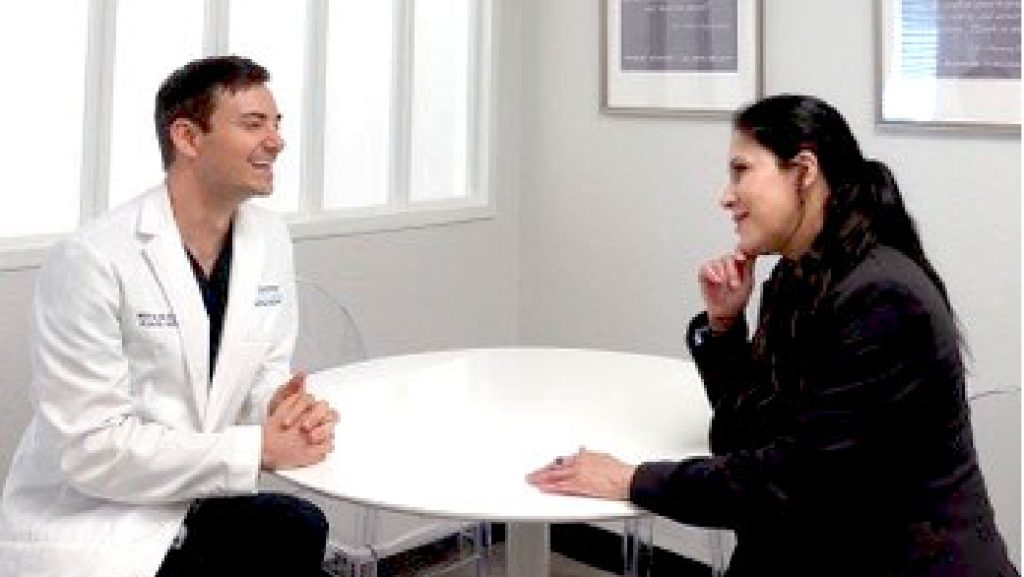
As Dr. Blagg puts it:
I think one differentiator in delivering results that a patient will love is being able to listen to their desires. I think so many surgeons rush to deliver what he/she sees as best for the patient, but my goal is to first listen to the person’s story and desires and then work with them to design the best care plan.”
He uses the example of breast augmentation. A “natural” breast size and position will vary between body types and will differ in each patient’s mind. His duty as a plastic surgeon is to listen and understand what the patient wants before offering his advice.
Dr. Blagg prioritizes creating a comfortable, welcoming, nonjudgmental space for patients to ask questions, share their concerns, and explore how plastic surgery can help them achieve their goals. He understands that for many patients, their consultation with him is often their first encounter with a plastic surgeon. By establishing a rapport with his patients from the beginning, he sets the tone for a collaborative, supportive surgical journey.
This personal touch resonates deeply with his patients. Dr. Blagg is frequently complimented on his calming bedside manner, and patients say they left the consultation feeling much more comfortable than when they first arrived. To see what else Dr. Blagg’s patients say about their experiences, please visit our Testimonials page.
Innovator and Early Adopter
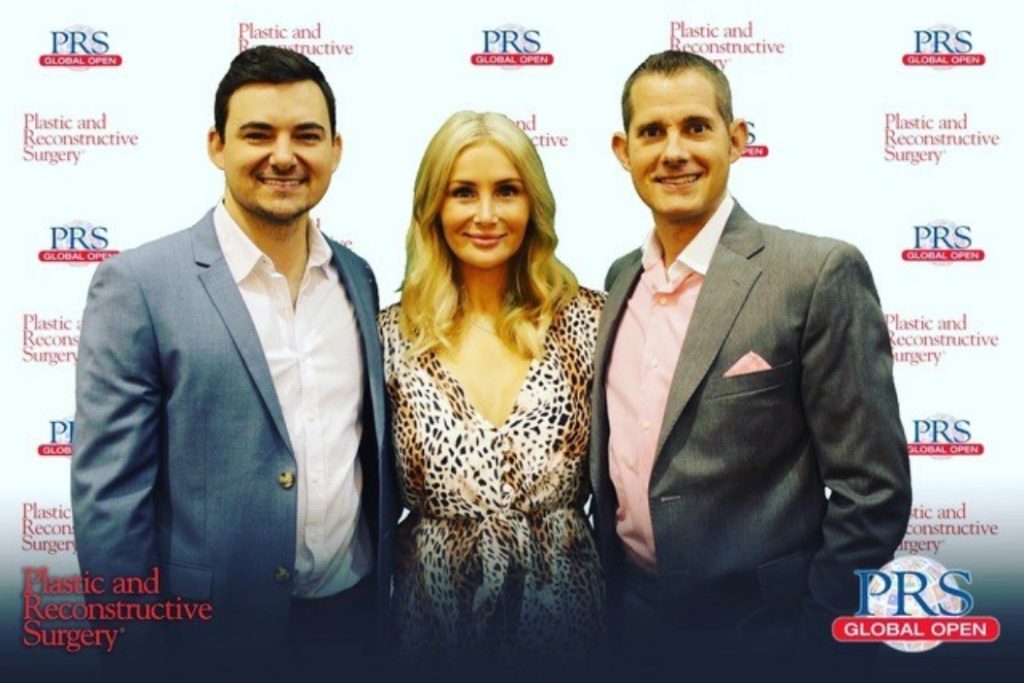
Dr. Blagg stays up-to-date on the latest surgical innovations and puts great thought and care into every aspect of the patient journey. He carefully vets the latest techniques and technology available for the value they offer to patients before introducing them to his practice.

For example, Dr. Blagg uses the Keller Funnel® in breast augmentation procedures, which allows him to more safely, hygienically, and comfortably insert silicone implants—and with a much smaller incision—than traditional methods. He also uses injections of local anesthetics during surgery to improve patients’ postoperative discomfort and reduce the amount of pain medication they need.
Among Dr. Blagg’s most exciting innovations, however, is one of his own creation. In 2021, Dr. Blagg developed his own supplement (The After Surgery Supplement) as an affordable option to help postoperative patients get the nutrients they need for optimal healing and recovery. This saves patients the expense and hassle of sourcing each component individually and also gives them peace of mind as to the ingredients’ quality and efficacy.
Distinguished Professional Life
Dr. Blagg has been honored with numerous accolades throughout his career, but his work has always been its own reward. When asked which award he is most proud of, Dr. Blagg had the following to say:
Awards are great, but I honestly can’t even tell you what awards are on my resume! When I think about the wall of my home office, one thing comes to mind, and that is a crayon drawing that one of my patients in Guatemala made me after I repaired his cleft palate. That’s the award I’m most proud of.”
Dr. Blagg continues to share this patient-first philosophy with the next generation of plastic surgeons. He is an affiliate professor for Texas A&M University College of Medicine and a frequent speaker at the University of Texas. He gets to know the medical students and residents and even invites honors pre-med students to shadow him at Synergy!
Author, Scholar, and Speaker
Throughout his career, Dr. Blagg has worked to advance knowledge in his field. He has published extensively in peer-reviewed medical journals, authored a book on post-weight loss surgery, and presented his research nationally and internationally.
His research interests have centered on craniofacial surgery, skin grafting and wound healing, and refining various diagnostic tools and surgical techniques to deliver better patient outcomes. Dr. Blagg is also passionate about surgical ethics and has advocated for thoughtful decision-making in surgery while critiquing unnecessary healthcare regulations.
He has also explored how university collaborations could create sustainable medical programs in underserved countries. This combination of technical expertise and patient-centered care reflects Dr. Blagg’s impact on both the clinical and humanitarian aspects of his field.
Noteworthy Credentials
In addition to being certified by the American Board of Plastic Surgery, Dr. Blagg is a member of several prestigious industry societies, including the:
- American Society of Plastic Surgeons
- American Society of Craniofacial Surgery (ASCFS)
- American Cleft Palate-Craniofacial Association (ACPA)
He is also a member of the Texas Medical Association and Travis County Medical Society. Dr. Blagg was named a RealSelf Top Doctor for his excellent reviews, expert insights, and engagement with the RealSelf community.
From the Ozarks to the Ocean
Growing up near a lake in the Ozarks of Arkansas, Dr. Blagg took up scuba diving as a teenager to go spearfishing. It wasn’t until he was 16 that he had a chance to dive in the ocean—a pivotal moment that gave rise to Dr. Blagg’s other passion: shark conservation!
During his undergraduate years, Dr. Blagg had the opportunity to study marine biology at James Cook University in Australia. He worked with Reef Check, diving along the Great Barrier Reef to monitor ocean temperatures and the condition of coral reefs.
He also did a “sea-mester” abroad in the Caribbean Ocean, focusing on oceanography and seamanship. Oceanic preservation and keeping habitats for the amazing beings that live there is a cause near and dear to Dr. Blagg’s heart.
As a shark conservationist, Dr. Blagg supports organizations like Shark Stewards and ensures that when he books a shark diving experience, it’s with a company that supports such efforts. And, of course, he tells everyone to watch “Shark Week!”
Life Outside the Office
Dr. Blagg is an avid adventure traveler and counts Portugal, New Zealand, and Ecuador among some of the favorite countries he has visited. He enjoys any activity that brings him to the mountains, oceans, or some of the natural spaces closer to home.
You can often find Dr. Blagg biking, running, or paddleboarding to Congress Bridge to watch the bats fly out at sunset. He also loves trying new restaurants and exploring Austin’s various workout classes. His motto, “the weirder, the better,” has even led him to do goat yoga with his mom!
Dr. Blagg is also a mixed-media artist who enjoys spending time in his studio downtown creating artwork. His creative streak emerges in other ways, too. Dr. Blagg has been involved in several product development projects and television and media productions.
Get to know Dr. Blagg in person by requesting a consultation online or calling Synergy Plastic Surgery at (512) 244-1439 today.
